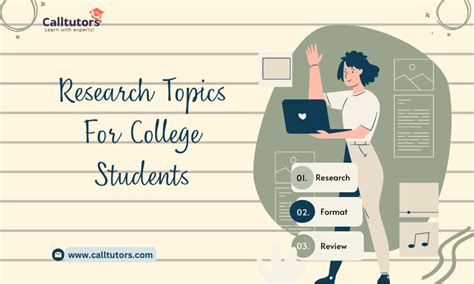As a college student, embarking on a research project can be both exciting and daunting. With the vastness of knowledge available, choosing a topic that aligns with your interests, skills, and academic goals can be a challenge. To assist you in this endeavor, this article presents a comprehensive list of interesting research topics across various fields of study, providing inspiration and guidance for your academic journey.

Understanding Research Methods
Before delving into research topics, it’s crucial to establish a solid foundation in research methods. These methods provide the framework and tools necessary to conduct rigorous and credible research. Consider exploring topics related to:
- Research Design: Qualitative vs. quantitative methods, experimental vs. non-experimental designs
- Data Collection: Surveys, interviews, observations, document analysis
- Data Analysis: Statistical techniques, content analysis, discourse analysis
- Research Ethics: Confidentiality, informed consent, plagiarism detection
Humanities and Social Sciences
Literature
- The Influence of Social Media on Literary Appreciation: An Analysis of Digital Book Clubs
- The Gender Dynamics of Dystopian Adolescent Literature: A Case Study of “The Handmaid’s Tale”
- The Impact of Artificial Intelligence on Literary Creation: A Computational Analysis of Text Generators
History
- The Role of Women in the American Civil War: A Re-examination of Primary Sources
- The Environmental Impacts of Industrialization: A Case Study of the Ruhr Valley, Germany
- The Intersection of Race and Gender in the Jim Crow Era: A Multidisciplinary Approach
Sociology
- Social Media and Adolescent Identity Formation: A Longitudinal Study
- The Impact of Economic Inequality on Educational Attainment: A Comparative Analysis
- The Role of Culture in Shaping Social Norms: A Cross-Cultural Investigation
Science and Technology
Biology
- The Effects of Climate Change on Coral Reef Biodiversity: A Field Study in the Great Barrier Reef
- The Potential of CRISPR-Cas9 Gene Editing for Treating Genetic Diseases
- The Microbiome and Its Impact on Human Health: A Literature Review
Computer Science
- The Ethics of Artificial Intelligence: A Critical Examination of Bias and Accountability
- The Role of Machine Learning in Cybersecurity: A Comparative Analysis
- The Potential of Quantum Computing for Scientific Discovery: A Simulation-Based Approach
Environmental Science
- The Impact of Deforestation on the Amazon Rainforest: A Remote Sensing Analysis
- The Role of Renewable Energy in Mitigating Climate Change: A Case Study of Solar and Wind Power
- The Environmental Impacts of Plastic Pollution: A Life Cycle Assessment
Business and Management
- The Effects of Employee Empowerment on Organizational Performance: A Comparative Study
- The Impact of Social Media Marketing on Consumer Behavior: A Case Study of a Small Business
- The Role of Leadership in Strategic Decision-Making: A Qualitative Analysis
Psychology
- The Effects of Mindfulness Meditation on Anxiety and Depression: A Randomized Controlled Trial
- The Relationship between Social Media Use and Mental Health: A Longitudinal Study
- The Impact of Attachment Styles on Romantic Relationships: A Cross-Cultural Investigation
Common Mistakes to Avoid
- Lack of Focus: Defining a research topic that is too broad or lacks a clear purpose.
- Insufficient Background Research: Failing to conduct thorough research to establish a strong foundation for your project.
- Poor Data Collection: Using unreliable methods or not collecting sufficient data to support your analysis.
- Biased Results: Influencing the results of your research through preconceived notions or flawed methodologies.
- Plagiarism: Presenting the work of others as your own without proper attribution.
Compare and Contrast Research Topics
| Topic | Strengths | Weaknesses |
|---|---|---|
| Influence of Social Media on Literary Appreciation | Connects literature to contemporary technology; explores the impact of digital platforms | Requires access to a large sample size of users |
| Environmental Impacts of Plastic Pollution | Analyzes the life cycle of a pressing environmental issue; provides data-driven insights | May require extensive field research or specialized equipment |
| The Role of Machine Learning in Cybersecurity | Addresses a critical aspect of modern technology; explores innovative solutions | Requires technical expertise in machine learning and cybersecurity |
Frequently Asked Questions (FAQs)
1. How do I choose a research topic?
Consider your interests, skills, and academic goals. Conduct background research to identify gaps in knowledge or areas where new perspectives can be added.
2. What are the key elements of a strong research question?
A strong research question is specific, focused, and arguable. It should be supported by evidence and have the potential to make a meaningful contribution to the field of study.
3. How do I conduct thorough research?
Use a variety of sources, including academic journals, books, and databases. Be critical of the information you find and evaluate it for credibility and reliability.
4. What are the ethical considerations in research?
Adhere to research ethics guidelines, including confidentiality, informed consent, and proper citation. Ensure that your research does not harm participants or perpetuate bias.
5. How do I write a compelling research paper?
Structure your paper logically, using an introduction, literature review, methodology, results, discussion, and conclusion. Write clearly and concisely, supported by evidence from your research.
6. What are some tips for presenting research findings effectively?
Prepare visually engaging presentations that clearly convey your key findings. Practice your presentation and be prepared to answer questions from the audience.
7. How can I make my research impactful?
Publish your research in academic journals, present it at conferences, or share it with broader audiences through social media or outreach activities.
8. What is the role of innovation in research?
Innovation can generate new ideas and approaches for research. Consider using creative thinking techniques and collaborating with others to explore novel perspectives.
